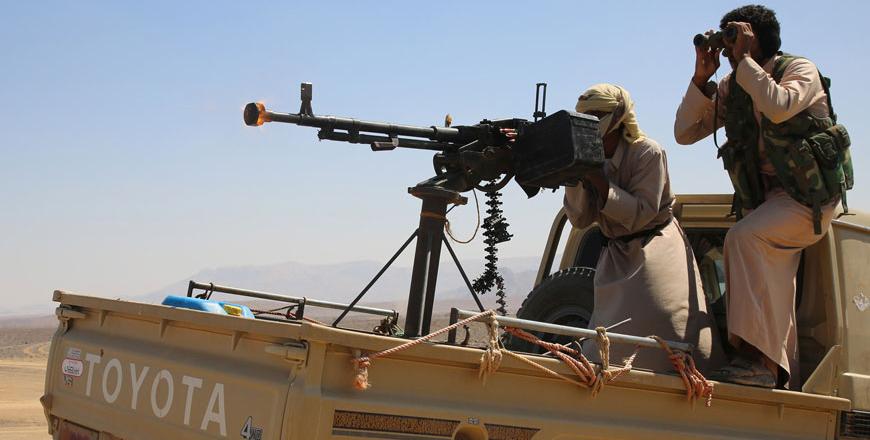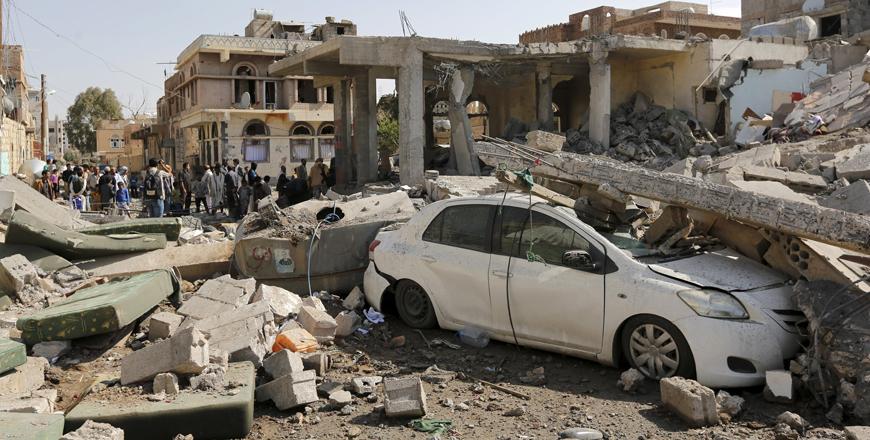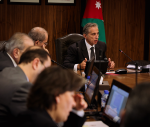You are here
Exiled Yemen government back in Aden amid military push
By AFP - Sep 16,2015 - Last updated at Sep 16,2015
ADEN — Yemen's government returned Wednesday to Aden after nearly six months of exile in Riyadh, as loyalists backed by a Saudi-led coalition pressed a major offensive towards the rebel-held capital.
Prime Minister Khaled Bahah and several of his ministers have relocated to the southern port, two months after forces loyal to exiled President Abed Rabbo Mansour Hadi pushed Iran-backed Shiite rebels out of the city.
Their return appears to reflect a stronger government grip on Aden, which Hadi designated the temporary capital after he fled house arrest in Sanaa in February.
It also comes as government troops advance in Marib province east of Sanaa, with air cover and ground support from coalition forces.
"The government has moved its base from Riyadh to Aden," government spokesman Rajeh Badi told AFP.
There was no indication that Hadi himself — who fled Yemen in late March when the Houthi rebels closed in on his refuge — was set to return.
Bahah's government will work from Aden, including "reinforcing the Popular Resistance in Taez" said the spokesman of pro-Hadi fighters battling rebels in the central region.
In March, the Saudi-led Arab coalition began an air campaign against the rebels and their allies among renegade forces loyal to ousted president Ali Abdullah Saleh.
Pro-Hadi fighters, backed by troops freshly trained and armed by Saudi Arabia, ejected the rebels from Aden in July and have since recaptured four other southern provinces.
The United Nations says nearly 4,900 people have been killed and some 25,000 wounded since late March, while 21 million out of Yemen's population of 25 million have been affected by the conflict.
In Marib, government forces have killed at least nine Houthi militants and captured five west of the provincial capital of the same name, military sources said.
Yemeni and coalition troops have also laid siege to Al-Mass military base, north of Marib, which is occupied by Houthis and their allies, the sources said.
Rebel positions pounded
Troops from both the United Arab Emirates and Saudi Arabia are taking part in operations.
The UAE lost 52 soldiers in a rebel missile attack on September 4 in Marib which killed 67 coalition troops.
Marib city is controlled by troops and tribes loyal to Hadi, but parts of the oil-rich province remain in rebel hands.
Meanwhile coalition warplanes on Wednesday pounded rebel positions around Sanaa, including Al Dailami Air Base near the airport, witnesses said.
Air strikes overnight targeted rebel posts north and south of the city, they said.
The escalation comes amid a diplomatic stalemate after Hadi's government backed away from UN-sponsored talks, insisting that the rebels first withdraw from territory they have seized.
On Tuesday, Hadi met UN envoy Ismail Ould Cheikh Ahmed who is trying to revive talks.
Hadi reiterated his demand for a Houthi implementation of UN Resolution 2216, which stipulates withdrawal from land occupied since 2014, the government's news agency said.
Analysts say that the battle for Sanaa is unlikely to bear fruit soon.
"A collapse of the Shiite militants' authority is far from imminent — or guaranteed over the medium term," said Jordan Perry of the UK-based risk assessment group Verisk Maplecroft.
"A year after seizing control of the capital, the Houthis remain well-entrenched in Sanaa."
Elsewhere, witnesses said masked arsonists on Wednesday torched St Joseph Roman Catholic church in the Aden's central Crater neighbourhood, one of the city's few remaining churches.
Twenty-two churches operated in Aden when it was a British colony before 1967, but only a few remain, used rarely by foreign workers and African refugees.
Yemen's population is 99 per cent Muslim.
Related Articles
ADEN — Iran-backed rebels retook positions in southern Yemen in a bid to advance on second city Aden, military sources said Sunday as a land
SANAA — The Saudi-led coalition backing President Abed Rabbo Mansour Hadi against Shiite Houthi rebels poured more reinforcements Thursday i
RIYADH —Yemen's premier was in Riyadh on Monday to meet President Abed Rabbo Mansour Hadi and the Saudi-led coalition backing their administ
















